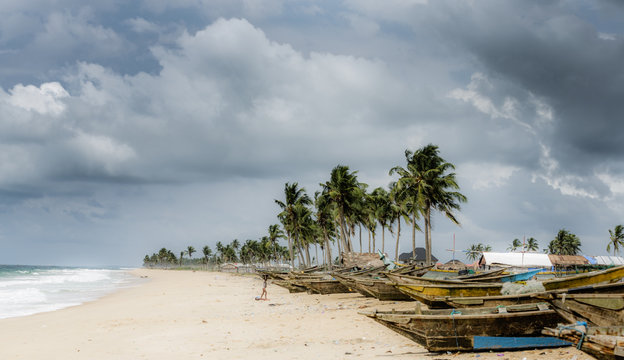Lagos, Nigeria’s bustling economic hub, is famous for its vibrant cultural scene, lively nightlife, and impressive beaches. With an extensive coastline along the Atlantic Ocean, the city is home to some of the country’s most famous beaches, such as Tarkwa Bay, Elegushi and Lekki Beach. These beaches have long been a draw for both locals during festive periods and tourists seeking relaxation and a glimpse of the sea.
However, in recent years, many of these beaches have been experiencing significant decline, raising alarms among environmentalists, residents and even the tourism sector.
Several . One of the most significant factors responsible for the gradual disappearance and degradation of Lagos’ beaches is coastal erosion, which has been exacerbated by a combination of natural and human-induced factors.
The coastline of Lagos, particularly in its island areas, has been experiencing severe erosion for decades. Natural processes such as rising sea levels, storm surges, and the action of tides have always influenced the shape and structure of the shoreline. However, human activities have made matters worse.
Urbanisation is a primary factor contributing to coastal erosion. Over the past few decades, Lagos has grown rapidly, with construction projects sprawling along the coastline. Many of these developments, including luxury hotels, residential complexes and infrastructure projects, have not adequately accounted for the impact on the natural coastline.
The building of seawalls, jetties and other barriers has disrupted the natural flow of sediment and water, exacerbating the erosion problem. Additionally, sand mining, which is carried out to supply construction materials, has also led to the depletion of the beach ecosystem and accelerated the loss of sand from the coastline.
Another major issue is the increasing impact of climate change. As global temperatures rise, so too does the sea level. The melting of polar ice caps and glaciers has contributed to a steady rise in sea levels, putting pressure on low-lying coastal areas like Lagos.
Storms and floods, which have become more frequent and intense due to climate change, also play a significant role in eroding the coastline. The impact of these changes is particularly evident during the rainy season, when heavy rains and increased ocean activity significantly erode the beaches.
An overwhelming impact
The decline of Lagos’ beaches has far-reaching consequences for both the environment and the economy. Environmentally, the loss of beaches and coastal areas has a negative impact on marine biodiversity. Beaches serve as critical habitats for various species of marine life, including birds, crabs, and sea turtles.
The erosion of these habitats disrupts the food chain and reduces the biodiversity of the region. Furthermore, the loss of vegetation and sand dunes, which help protect the coastline from the effects of waves and storms, leaves the area more vulnerable to further erosion and environmental degradation.
The economic impact of beach degradation is equally significant. Tourism is a major contributor to Lagos’ economy, and its beaches play a pivotal role in attracting both domestic and international visitors. Beaches like Tarkwa Bay and Elegushi are popular destinations for tourists, with many coming to enjoy the serene environment, engage in water sports, and relax by the shore.
As these beaches continue to erode, the loss of tourism revenue is inevitable. Local businesses that rely on beach tourism, including restaurants, hotels and vendors, face the threat of declining patronage. The decline in beach quality also leads to a drop in real estate values along the coastline, as properties lose their appeal due to the proximity to degraded beaches.
Additionally, beach erosion has increased the vulnerability of coastal communities. Many people live along the coastline, and their homes are now at risk due to rising tides and the encroaching sea. Erosion not only threatens their homes but also endangers their livelihoods, as many depend on fishing, tourism, and other coastal activities for income. The displacement of residents due to flooding and erosion has become an increasingly pressing issue, requiring urgent intervention from both the government and private sectors.
An immediate solution is the implementation of coastal protection measures. Building and reinforcing seawalls, groynes, and breakwaters can help to reduce the impact of waves and prevent further erosion. However, such interventions need to be carefully planned to avoid disrupting natural processes and exacerbating the problem in other areas.
In addition to physical barriers, sustainable coastal management practices are crucial. Restoring sand dunes, replanting vegetation and enhancing natural defenses can help mitigate the effects of erosion. These nature-based solutions, although slower to implement, offer long-term benefits by preserving the natural ecosystem while protecting the coast.
Another important strategy is the regulation of sand mining and construction activities along the coastline. Ensuring that developers adhere to environmental regulations can help reduce the human impact on the beaches. It is also essential to promote the use of environmentally friendly building materials and construction techniques to prevent further damage to the coastline.
Finally, addressing the broader issue of climate change is essential. Governments must implement policies to reduce carbon emissions and support global efforts to mitigate the impacts of climate change. By working towards global climate goals, Lagos can help reduce the rising sea levels that are contributing to the erosion of its beaches.
Lagos, Nigeria, renowned for its vibrant culture and famous beaches like Tarkwa Bay and Elegushi, is facing critical coastal erosion threatening both the environment and economy. This erosion, exacerbated by rising sea levels, storm surges, and unchecked urbanization, disrupts marine biodiversity by degrading habitats and vegetation, leaving the coastline vulnerable. Economically, it impacts tourism, a key contributor to Lagos' revenue, decreasing beach attractiveness and threatening local businesses dependent on tourism. This erosion risk further endangers coastal communities' homes and livelihoods, necessitating urgent intervention.
Proposed solutions include constructing seawalls and adopting sustainable coastal management practices like restoring sand dunes and regulating sand mining to alleviate human impact. Additionally, addressing climate change through emission-reduction policies is crucial to curtail rising sea levels and beach erosion. These immediate and nature-based responses aim to protect Lagos’ coastlines, thereby preserving the economic and environmental benefits they offer.






